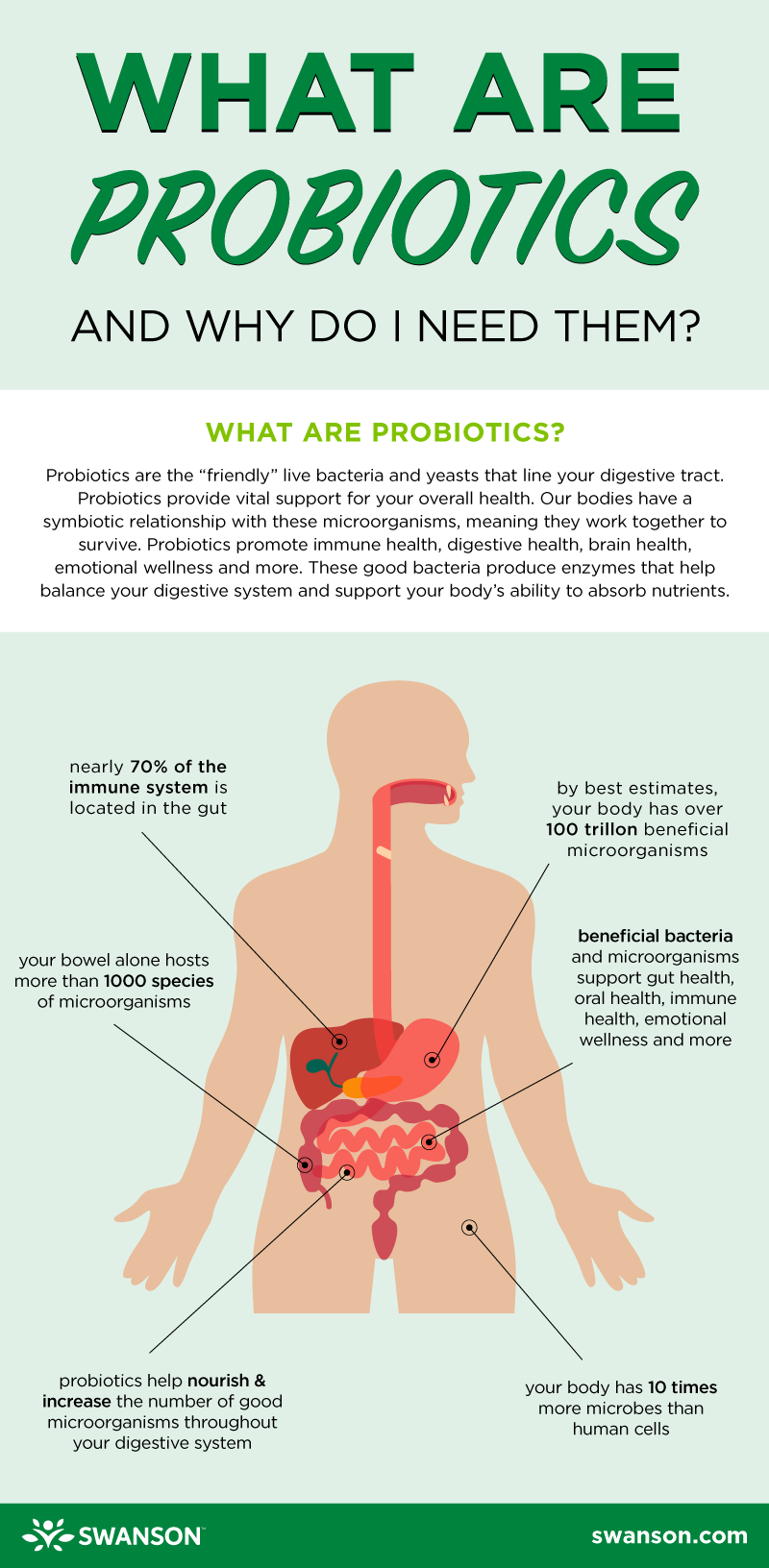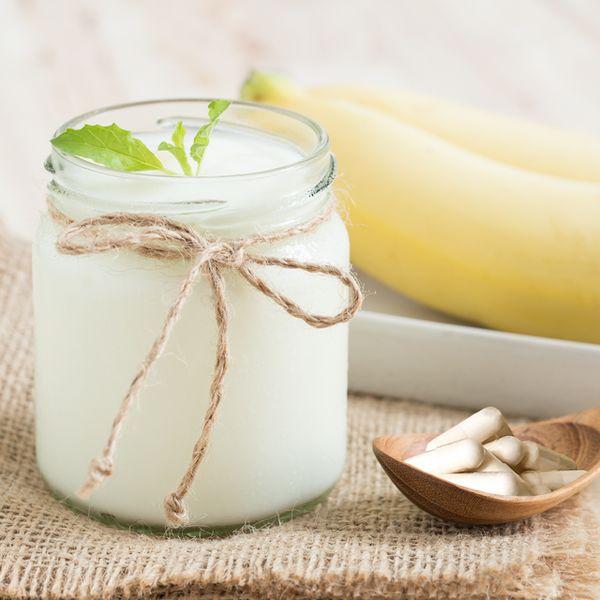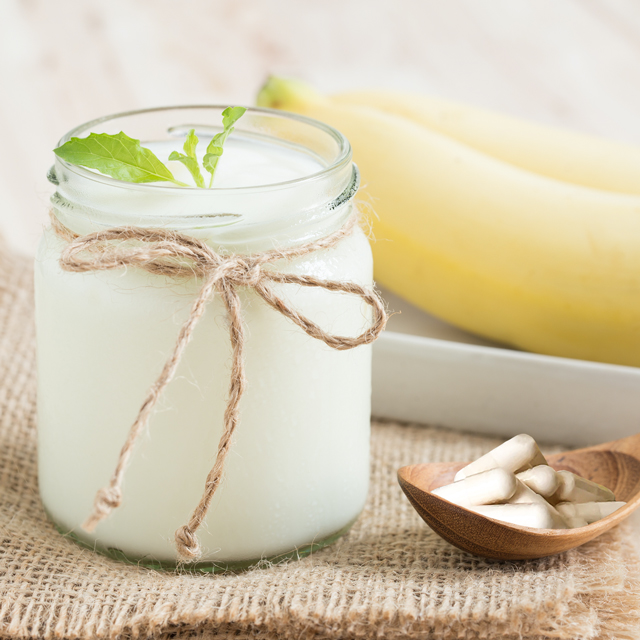The Facts on Probiotics
Probiotics are one of the hottest topics in the health industry, and for good reason. Probiotics are widely considered a staple for any daily regimen. These friendly bacteria work overtime for your overall wellbeing, offering support for digestive health, immune health, neurological health and emotional wellness. But what exactly are probiotics and how do they help you?
What Are Probiotics?
Put simply, probiotics are “friendly” live bacteria and yeasts that line your digestive tract. The documented definition of probiotics, according to the Food & Agriculture Organizations of the United Nations (FAO) and the World Health Organization (WHO) is “live microorganisms, that when administered in adequate amounts, confer a health benefit on the host.”1 The word probiotic actually translates to “for life”–combining the Latin preposition “pro,” which means “for” with the Greek word “biotic,” which means “life.”2
“Probiotics” is an umbrella term for all the different beneficial bacteria, but each strain or type of bacteria offers unique benefits. As a whole, probiotics provide vital support for your overall health. Most people tend to think of bacteria negatively, but probiotics are the opposite. Our bodies have a symbiotic relationship with these microorganisms, meaning they work together to survive. Probiotics promote immune health, digestive health, brain health, emotional wellness and more. Good bacteria produce enzymes that help balance your digestive system and support your body’s ability to absorb nutrients.
Quick Probiotic Facts
- “Probiotics” is an umbrella term for beneficial bacteria, but each strain is studied separately and offers unique benefits.
- Probiotics are measured in CFUs, or colony-forming units, which is an estimate of the number of viable (live) bacterial cells.

Probiotic Benefits: It Begins in the Gut
Did you know that nearly 70% of your immune system is located in your digestive system?3 That brings a whole new meaning to “you are what you eat!” Actually, almost all of your bodily systems rely on balanced gut health to function at their best.
Unfortunately, many aspects of modern life may deplete your gut microbiome. Stress, pollution, processed foods, lack of nutrients and other factors can unbalance the beneficial bacteria in the gut.4 Supplementing with probiotics to continually replenish good bacteria may help you support optimal immune system function and maintain ongoing wellness.
What’s the Ideal Gut Bacteria Ratio?
Unfortunately, there’s no clear answer to this. Researchers haven’t determined what an ideal gut flora looks like because individuals vary so widely — yes, even healthy individuals. Each person’s gut flora is different, from the number of strains in their gut to the total number of microorganisms.
However, best estimates are that the average healthy bowel is home to 100 trillion microorganisms, including more than 1000 different species.4,5
Probiotics Beyond Gut Health
Gut health is in the spotlight, but there are other parts of the body where friendly bacteria thrive. Some friendly bacteria only live in your mouth and help promote oral health. These friendly oral bacteria help balance other bacteria that may cause bad breath.6
Probiotics are also important for women's health. The lactobacilli strains, in particular, have been studied for their role in supporting and maintaining vaginal and urinary tract health. These strains may protect the urogenital tract by excreting biosurfactants that help keep vaginal tissues clean and healthy. 7
Food Sources of Probiotics
You probably already associate probiotics with yogurt. As a fermented dairy product, your favorite yogurt may be a natural source of friendly bacteria, but only if the label specifies that it contains “live, active cultures.”
Yogurt isn’t the only food source of probiotics, though. Other unpasteurized, fermented dairy products like kefir contain probiotics. Unpasteurized, fermented vegetables (think sauerkraut or kimchi) and kombucha also contain probiotics. Noticing a pattern? The fermentation is what allows friendly bacteria to thrive, making fermented foods the original source of gut-nourishing probiotics.
Probiotic Supplements & Probiotic Foods
Eating fermented foods for probiotic benefits has its limitations. For example, how do you measure how many good bacteria you are getting? The number of CFUs in a serving of fermented foods can vary by brand and even by batch of product. And while some brands guarantee a certain number of CFUs in each package, food labels aren’t required to list the strains of bacteria, so you can’t be quite sure what you’re getting. Many strains of bacteria have not yet been studied, making it hard to know if high numbers of CFUs in food are actually beneficial.
There are hundreds of different strain types, so how do you know which ones to look out for? Here’s a look at some of the most common strains.
Popular Probiotic Species & Strains
- Lactobacillus Species: The most populous bacteria in the small intestine are from the Lactobacillus species. They produce lactase and lactic acid, helping to break down nutrients and support digestion.
- L. acidophilus: one of the most researched (and most popular) strains and often found in fermented foods and added to yogurts; L. acidophilus supports overall digestion, nutrient absorption, immune health and vaginal health
- L. rhamnosus: a popular probiotic among travelers for promoting digestive health while abroad; also promotes vaginal health and plays an important role in maintaining immune function, plus L. rhamnosus G.G. is one of the most studied probiotic strains
- L. fermentum: promotes overall digestion
- L. reuteri: supports digestive, oral and immune health
- Bifidobacterium Species: Like the Lactobacillus species, Bifidobacterium produce lactic acid and help maintain a healthy balance of gut flora. Strains in this species also support immune system function.
- B. Bifidum: helps promote bacterial balance and the breakdown of nutrients
- B. lactis: promotes gastrointestinal health and immune function
- B. longum: supports digestive health and immune function
- Saccharomyces Boulardii: A beneficial yeast used as a probiotic agent to support gastrointestinal health and often used by people who travel.
If you opt for probiotic supplements, you have more control over which strains you’re getting since probiotic supplements will list the strains and CFUs of each strain on the package.
Another (potential) downside to relying on fermented foods is the frequency you’d have to consume them. For example, most studies about yogurt or other fermented foods involve participants eating two or more servings a day. So, many people opt for probiotic supplements to continually replenish the good bacteria in their gut.
What’s the magic number of CFUs to shoot for? Unfortunately, there’s no clear answer to this question, since individual microbiomes vary so much. It’s always a good idea to see what your doctor recommends. Many probiotic supplements contain more than 1 billion CFU, and some contain up to 66 billion!
Regardless of whether you choose a supplement or food source for your probiotic intake, there’s no doubt that these friendly bacteria are vital to overall health.

About Lindsey Toth, MS, RD
Registered Dietitian, Swanson Health Products
Lindsey is a nationally recognized registered dietitian and nutritionist with a soft spot for ice cream. She empowers people to take charge of their health by finding the balance between the pleasure and nourishment in food.
Her philosophy is that you should take care of your body because it’s the only permanent home you have. It’s what inspired her to pursue a career in nutrition and, ultimately, led her to Swanson Health Products.
*These statements have not been evaluated by the Food and Drug Administration. These products are not intended to diagnose, treat, cure or prevent any disease.
____________________________________________________________________________________Sources
1 The International Scientific Association for Probiotics and Prebiotics consensus statement on the scope and appropriate use of the term probiotic. PubMed. https://www.ncbi.nlm.nih.gov/pubmed/24912386
2 What are Probiotics? News Medical. https://www.news-medical.net/health/What-are-Probiotics.aspx
3 Let’s Talk About Health: “Adding Years to Your Life, and Life to Your Years” https://books.google.com/books?id=LDdFDwAAQBAJ
4 The Impact of Diet and Lifestyle on Gut Microbiota and Human Health. National Library of Medicine. https://www.ncbi.nlm.nih.gov/pmc/articles/PMC4303825/
5 The healthy human microbiome. National Library of Medicine. https://www.ncbi.nlm.nih.gov/pmc/articles/PMC4848870/
6 To Beat Bad Breath, Keep the Bacteria in Your Mouth Happy. Scientific American. https://www.scientificamerican.com/article/beat-bad-breath-keep-mouth-bacteria-happy/
7 Vaginal Microbiota and the Use of Probiotics. National Library of Medicine. https://www.ncbi.nlm.nih.gov/pmc/articles/PMC2662373/




